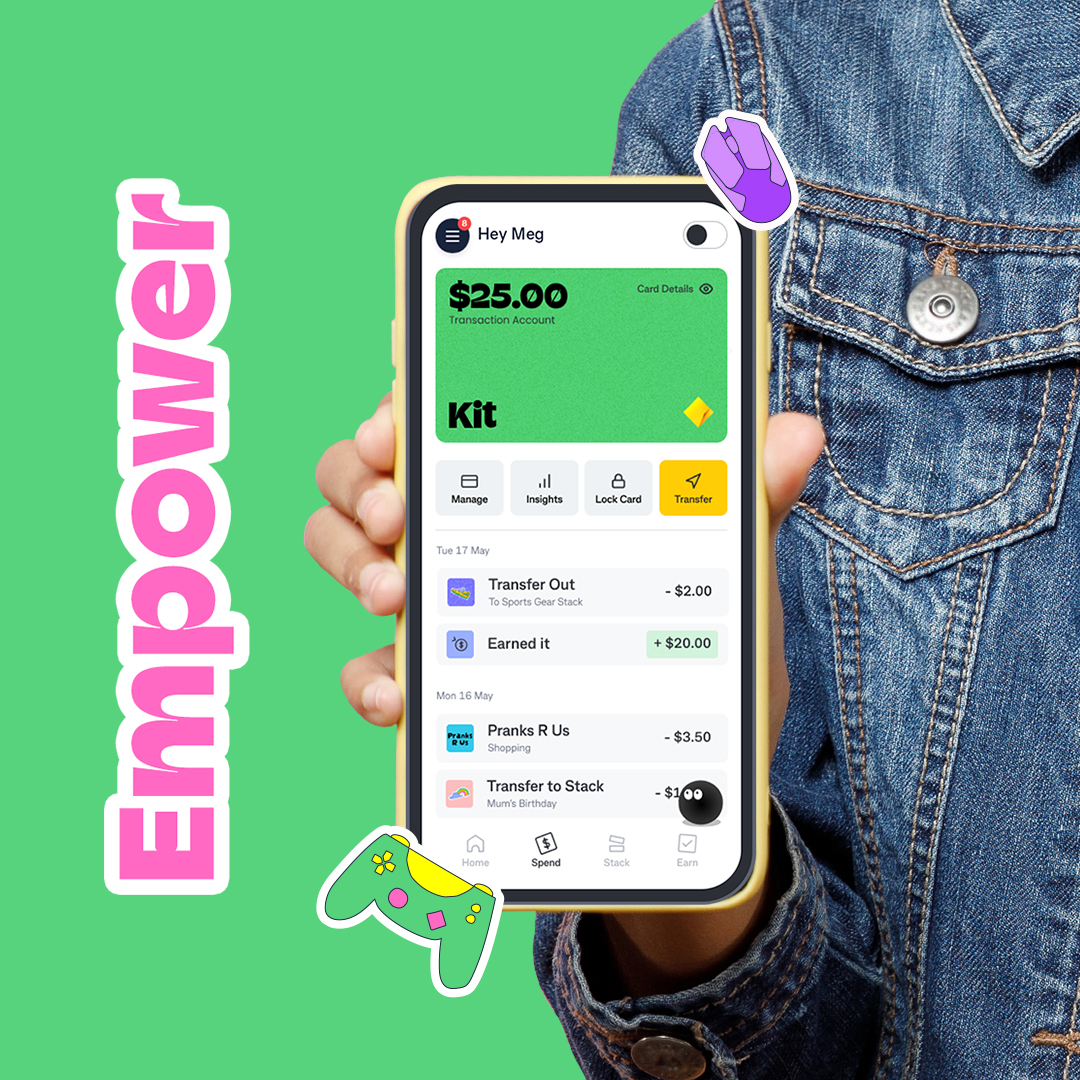Your kid’s online world of play is colourful and vibrant. So much to do, so much to explore, so much to spend money on. Ouch! Plus, it’s not their own money being spent. It's yours. YouGov's latest report commissioned by Kit, has revealed that one in two parents with children aged 8-17 say their children have spent their money without them knowing. And if your kid falls in the 11-13 bracket, you’re in the eye of the storm! In-app purchases are the primary offender.
Yet, in-app purchases are part and parcel of the experience as your kid ventures through their digital playground. Enjoyment, progress, social inclusivity. 44% of Aussie kids want to spend their pocket money on video games! Yet, where does experience enrichment end, and excessive spending begin? Still more perplexingly, how do we teach our children to draw this line on their own?
You’re not alone in the quest to teach your kid smart online spending. Here’s Kit’s two cents.
44% of Aussie kids want to spend their pocket money on video games!
Become fluent in their language
To be able to teach smart spending, first you must understand what their spending looks like.
- What is their currency? Do they trade in Gold, Gems, XP, or in Rainbow-Coloured Skateboards?
- What do they buy with these skateboards? Is it new character skins, upgraded farming tools, or entrance into social spaces?
- Why do they need these new character skins? Is it because creativity is important to them, because all their friends have bought it, or just because a pop-up told them to?
The better you can speak their language, the better you will be able to communicate about the important things. If you’re part of the 72% of Aussie parents concerned about the influence of online games on their children’s buying behaviour, pull up the iPad, Xbox or Nintendo and have some fun.

72% of Aussie parents are concerned about the influence of online games on their children’s buying behaviour.
Empower them with responsibility
Experience is the best teacher, especially when it comes to making smart spending decisions. Yet, the trouble with handing over the money-experimentation-reigns to your mini-me, is the steep downward slope just around the corner; unhealthy money lessons for your kid, a hip pocket dent for you.
How to avoid this? Find a safe place for them to play, like Kit!
Kit gives your kid independence with a personal account and prepaid card. Kit nurtures best behaviour, while you get to set the ground rules thanks to some serious safety features. And for ultimate piece of mind, you get crystal clear visibility of what they’re up to.
Allowing your kid to “play” with money online can be done right by giving them enough responsibility to experiment, yet sufficient support to do so safely. Yet, padded around the edges and sprinkled throughout, is proactive support to help them earn, save, and spend with confidence. Check out Kit to effectively guide your kid’s most formative financial experiences.

Give them some real-talk about spending money
Understanding the relationship between actions and consequences is the winning piece to making smart spending decisions (especially when it comes to online spending). To make sense of this, let’s step into a little pair of shoes. Here’s what you see…
Your grownup walks into the grocery store, fills up their basket with bananas and fruit loops and yoghurt. When they get to the front, they tap their magical rectangle, and voila, they get to take everything home! Then, at home, they download that game you’ve asked for one hundred (million) times. You take the phone, and after a few minutes, the app asks if you’d like to ‘Buy Gold (as an in-app purchase for $12.99)?’. You tap ‘Yes!’, because obviously, you want the gold. What a cool little rectangle, magic!
Taking a step back into your (slightly larger) shoes, you can begin to see why the action-consequence piece matters. To your little grownup, the action of tapping the card or paying online, doesn’t yet link to the outcome of spending physical money. In today’s cashless society, this lesson is no longer incidentally learnt at a young age.
Here are some conversation starters to help demonstrate this relationship to your kid and connect it to their money.
- The relationship between earning and spending. You can only spend what you earn!
- The science behind the magical rectangle (your card!). How does it work?
- The action of spending… and the consequence of their account balance going down.
But don’t just stop there! Aussie children want to learn about their money. Chances are, your kid wants to know about online gaming currency, in-game purchases, how to earn money as a gaming or social media influencer, and other online investment opportunities such as NFT’s. Now’s your chance to start these conversations.
Chances are, your kid wants to know about online gaming currency, in-game purchases, how to earn money as a gaming or social media influencer, and other online investment opportunities such as NFT’s.
Join their journey and celebrate their wins!
There are no strict criteria which characterise a spending decision as ‘good’ or bad’. This makes the path to being able to make good spending decisions a long and personal one. As your little grownup treads this road, they will need your support to develop a good sense of judgement.
This involves keeping an open line of communication. Discuss the new games they’re playing, what they’re buying, and what they’re thinking of buying. Here are some topics to discuss with your kid when it comes to a potential or past purchase.
- Why are they buying it? Have them brainstorm what a ‘need’ versus a ‘want’ could be.
- Is it the best way that money could be spent? Maybe it is better saved towards a bigger purchase or more ‘wanted’ spending goal?
- Do they think it’s a clever decision, why or why not?
When they make a good spending decision, celebrate, and show them the enjoyment of smart spending. In the case of a not-so-good decision, use it as an opportunity to reflect and discuss spending habits.

Bring it all together.
As a modern parent, your kid’s world of play lives largely behind their screens. It feels near impossible to effectively monitor and set boundaries. Their functional world of money now too, lives behind screens, not in the piggybank on their desk. With a bit of help from Kit and these conversation starters, you can create a safe space for your kid to develop good judgement, understand key financial concepts, and become a smart spender! For general help on online safety basics, visit the Australian government’s eSafety website.
Sign up for early access to Kit
Kit is an earning-and-learning money app for kids. Sign up for early access now. Be quick! Only 1500 spots remaining.
Don't let games play with your kid or your cash.
Source: YouGov survey of over 2,000 parents, guardians and caregivers of children aged 8-17, commissioned by Kit.

Any advice given does not take into account your objectives, financial situation or needs so please consider whether it is appropriate for you.


